Welcome to Light On Light Through, Episode 358, in which I review Bosch: Legacy, episodes 2.1-2.6, on Amazon Prime Video.
Read this review (with links to reviews of earlier seasons, including the very first season of Bosch).
reviewing 3 Body Problem; American Rust; Bosch: Legacy; Citadel; Curb Your Enthusiasm; Fauda; For All Mankind; Foundation; Hijack; House of the Dragon; Luther; Outer Range; Outlander; Reacher; Severance; Silo; Slow Horses; Star Trek: Strange New Worlds; Surface; The: Ark, Diplomat, Last of Us, Lazarus Project, Orville, Way Home; Tokyo Vice; True Detective; You +books, films, music, podcasts, politics
George Santayana had irrational faith in reason - I have irrational faith in TV.
Welcome to Light On Light Through, Episode 358, in which I review Bosch: Legacy, episodes 2.1-2.6, on Amazon Prime Video.
Read this review (with links to reviews of earlier seasons, including the very first season of Bosch).
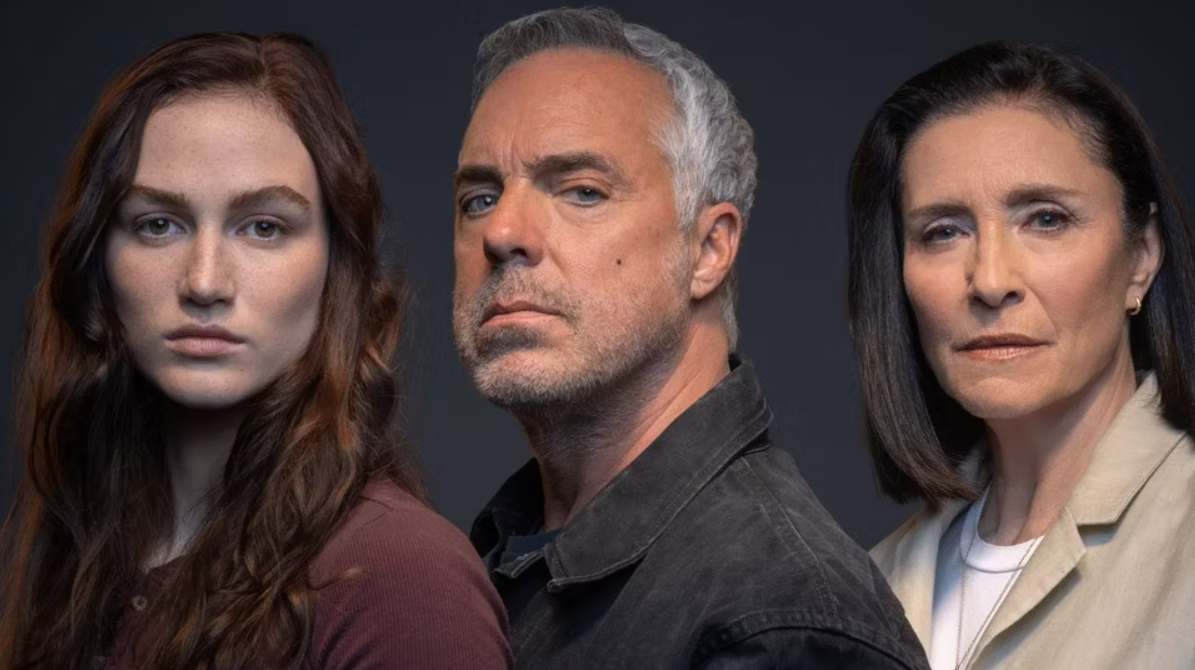
Bosch: Legacy episodes 2.5-2.6 are now up on Amazon Prime Video, continuing this powerful season of this stellar series.
[Spoilers ahead ... ]
First, Madison Lintz continues to really impress with her performance as Harry's daughter, Maddie Bosch. Her stepping up and confronting her attacker in the courtroom as she testifies to the deleterious impact the attack had on her life, was an outstanding piece of acting. And she's equally good in her scenes with her partner as well as her boyfriend, delivering emotional subtlety and even humor in the breakneck world she inhabits.
It's good to see Max Martini back on the screen -- I first saw him years ago in The Unit -- this time as the brutal, villainous Detective Don Ellis. Bosch in the original series was always confronting crooked cops, but this time, Ellis is highly intelligent, with a strong partner Detective Long who's willing to do Ellis's bidding, and together they make a formidable adversary to Harry, Maddie, and Honey Chandler.
Mo also continues at the top of his game in these episodes, as well as finding some romance with a sexy podcaster. Good for him. He deserves more from life than just chips and hacks. And Harry will need all the help he can get against Ellis and Long, as he slowly gets to the bottom of the murder that brought Honey and Maddie and him into the sights of these murderous detectives and what bigger marauders they may be working for in the first place.
And I'll see you back here after Prime Video dishes out some more episodes.
See also Bosch: Legacy 2.1-2.4: Better and Better
See also Bosch: First Half: Highly Recommended ... Bosch: Second Half as Fine as the First ... Bosch Season 2: Dragnet with Uber ... Bosch 3: Best Season So Far ... Bosch 4: Delivering and Transcending the Genre ... Bosch 5: Room with a Killer View ... Bosch Season 6: The Best Police on Television ... Bosch Season 7: Can't Let Go ... Bosch: Legacy: Even Better than Bosch
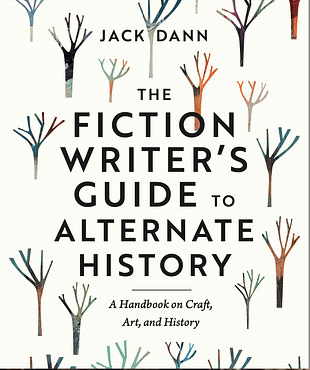
I've always had a keen love of alternate history science fiction. Amazon Prime Video's The Man in the High Castle series (2015-2019), a mostly brilliant adaptation of Philip K. Dick's path-breaking 1962 novel, in which the Axis won the Second World War, was pretty much from the moment I started watching it easily the best drama I've ever seen on television, and still is. (Here's an interview I did with Rufus Sewell in 2021 about the leading character he played in the series, one who wasn't in Dick's novel.)
But as much as I love alternate history, I didn't really start writing it until "It's Real Life," a story in which John Lennon wasn't murdered and The Beatles were still together and making music in 1996. That story was a finalist for the Sidewise Award, bestowed today for the best "short form" published in 2022. An ideal time for me to read and review Jack Dann's Fiction Writer's Guide to Alternate History.
The heart of this remarkable book is a colloquium, conducted in the previous decade among the leading writers of alternate history. I heard of all of them, met some of the them, and have read something between between all and some of their alternate history fiction. They respond to Jack Dann's prompts, and I don't think they saw each other's responses. They differ on what the "rules"of alternate history should be, including about whether there should be rules at all, consciously or unconsciously followed. They of course draw upon their own works as examples, in seeming violation of I. A. Richard's warning against the "intentional fallacy," that is, relying upon what authors say they intended in their work, but this doesn't really matter, because the authors in Dann's book also talk about work by other authors in the book, as well as authors not in the book, and their arguments can be evaluated without reference to their work.
One of their points that most struck me is Bruce Sterling's (p. 119) that “Commonly they’re [alternate histories] about troubled times in which the author has some kind of solution to offer.” This is exactly why I wrote "It's Real Life": it always seemed to me that the world in which John Lennon was assassinated was a deformation of the way reality was supposed to be, and I wrote the story to give the world a taste of the way it was meant to be. Pamela Sargent (p. 121), makes a similar point, writing that “Back in the early 1990s, I gave a talk at one convention in which I said that I had the persistent impression that all of us were living in a weird variant that had branched off from the main continuum," as does Paul Di Filippo (p. 97), who tells us that “I think the best such [alternate history] stories arise from creating a world the author would like to at least explore or even inhabit."
These and numerous other insights and explications in Dann's handbook are invaluable to authors at any stage in their careers. If they're just starting out, it provides a blueprint -- which as Dann makes clear, they needn't follow if it goes against their grain -- and if you're an old hand, you'll find the comfort of better understanding just why you chose to do this or that in the narrative you just wrote, or maybe just finished, because you started it a long time ago, a crucial way of writing for many a writer, also discussed in Dann's book.
Another point of discussion of special interest to me, because I've written half a dozen books on media history, and that's a lot of what I teach as a professor at Fordham University, is what these authors of alternate histories think of our "real" history. I put "real" in quotes because, as George Zebrowski (p. 120) notes, and I agree, “Tentative history is all we have, and in science fiction we can rehearse as many as we can imagine.” Yet to make this issue even more provocative, while Kim Stanley Robinson (p. 90) agrees that "all history is a fiction, and as such, maybe it’s always an ‘alternative history,’” John Kessel (p. 83) insists that “I want the counterfactual to illuminate some element of real history,” and I agree with that, too. Indeed, I think for a counterfactual or alternate history to work (some of the authors argue these have two different meanings, I do not), the story has to have some number of real signposts, to keep our appreciation of the alternate history on track.
Jack Dann of course also writes tellingly about his own alternate histories. He talks about how Milton's Paradise Lost and John Martin's illustrations of them a century later were inspirations and building blocks for Dann's own Shadows in the Stone (2019). All authors need inspirations, they're obviously essential, but you can't create them. The best you can do is recognize them and then act upon them when you're ready. In effect, the whole of The Fiction Writer's Guide to Alternate History is a treatise, in part multi-authored, of what inspires the imagining and writing of alternate histories.
I realized the moment I started writing "It's Real Life" that I was inspired by Peter Jackson and his The Beatles: Get Back documentary. I saw its three parts the instant they were released on the Thanksgiving weekend in 2021, and wrote "It's Real Life" in January 2022. In a way, that documentary is both an alternate history and it epitomizes the interplay of alternate and "real" history that is one of the central themes of Dann's book. What were The Beatles really like as they stood on edge of disbanding in the history we all remember and most of us deeply regret. Jackson has hours of outtakes recorded when The Beatles were making the depressing Let It Be documentary that proves they were far happier than we've been told and we "remember". Or were they? After all, they did break up.
I was so energized by Jackson's documentary that I wrote an alternate history in which The Beatles didn't break up. I've expanded it into a short novel that I haven't yet shown to anyone, except my wife, who read an earlier draft. I'll no doubt go over it at least a few more times before I decide what to do with it. Will I be influenced by the exhilarating experience I just had reading Jack Dann's Fiction Writer's Guide to Alternate History? Will I follow or break some of the rules that Dann and many of the authors in that book say can and maybe should be broken? I don't know. But you can find out by reading The Writer's Guide to Alternate History now, and It's Real Life the novel whenever it's published.
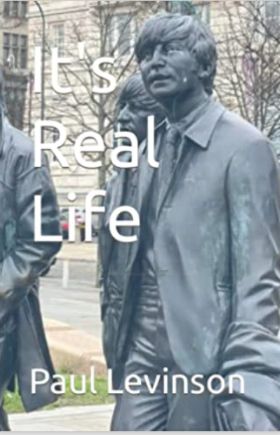
Get "It's Real Life" in paperback, or on Kindle, or read for free here.

I'll be at the World Fantasy Convention 2023 this weekend -- VIRTUALLY via Zoom -- starting tomorrow, Thursday, and on two panels:
THURSDAY: 12:00 PM - 12:50 PM (Central Time) The Best of Both Worlds? Hybrid Self/Traditional Publishing In the unending debate of traditional vs self-publishing, some authors ask, why not both? Join a panel of hybrid authors as they talk about their journey to hybrid publishing, what the positives and negatives have been for them, and how might this model serve you? Paul Levinson (M), Summer Hanford, Gini Koch
SATURDAY: 10:00 AM - 10:50 AM (Central Time) Beyond Dirigibles: Mixing Historical Fantasy with Futurism Let’s take retrofuturism a step farther. Beyond steampunk or even gaslamp, what happens when someone drops futuristic technology into a historical fantasy? What are some of our favorite examples? Jenny Rae Rappaport (M), Molly Tanzer, Aparna Verma, Paul Levinson, Rich Horton
Both of these panels are hybrid, meaning you can attend them in person if you're at the Con, in the Atlanta/New York room.
Welcome to Light On Light Through, Episode 357, in which I join Captain Phil on WUSB-FM Radio (Stony Brook, New York) and Marybeth Ritkouski, Michael Rizzo, and Roy Bjellquist in a 2-hour in-depth, fun discussion of Star Trek: Strange New Worlds.

I caught the first four episodes of the new (second) season of Bosch: Legacy on Amazon Prime Video, the post-Bosch series in which Harry has moved from LAPD to private investigator (still living and working in Los Angeles) and his daughter Maddie has joined the LAPD. I thought and said the original Bosch series was the best cop show on television, and the first season of Legacy was even better than Bosch. Well, so far the second season -- or at least the first four episodes -- are sheer dynamite, emotionally, and in overall storyline and acting -- and even better than the first season. (Queue The Beatles' "It's Getting Better All the Time".)
[Spoilers ahead ... ]
Maddie is really coming into her own as a police officer, indeed so much so, she attracts a kidnapper and becomes the centerpiece of the first two episodes. Poppa Bosch will understandably do anything to save his beloved daughter, and he's helped by his old partner J. Edgar, as well as the perennial Crate and Barrel. Now, obviously, the Legacy series wouldn't be so dumb as to kill off Maddie, as big a star in this sequel series as her father, and knowing this makes the tension and excitement of how she's rescued even more impressive to see on the screen.
The third and fourth episodes introduce a new, suitably dangerous story, as it pulls some strings embedded in previous seasons. Unlike the first two episodes, in which Maddie's kidnapping is resolved as her father uses every ounce of his intelligence and instincts to save her, the fourth episode keeps us on the edge of suspense right through the end. Maddie gets a promotion, Honey Chandler plays a central role, and these episodes teem with the full gamut of LA cops, good, bad, and former. It was also good to see Mo back this season with tech smarts and sarcasm.
The acting is better than ever. Madison Lintz as Maddie is the epitome of getting better and better, and everyone else, including Titus Welliver as Bosch are as superb and incisive as ever. I'll conclude this review, though, with my typical current complaint about Amazon Prime Video and Netflix: I miss the days when I could binge complete seasons as soon as the new season was available. So ... I'll see you back here as the new episodes of Bosch: Legacy are doled out.
See also Bosch: First Half: Highly Recommended ... Bosch: Second Half as Fine as the First ... Bosch Season 2: Dragnet with Uber ... Bosch 3: Best Season So Far ... Bosch 4: Delivering and Transcending the Genre ... Bosch 5: Room with a Killer View ... Bosch Season 6: The Best Police on Television ... Bosch Season 7: Can't Let Go ... Bosch: Legacy: Even Better than Bosch
I'm really getting sick and tired of The New York Times. I first began getting more than irritated with the newspaper of record when it over-reported the non-story about Hillary Clinton's emails, on the eve of the 2016 election. I won't go into all the poor reporting I've noticed in their pages since then.
But now there's something much worse than all of that. When word first came in about the terrible loss of human life caused by the rocket or bomb exploding in the courtyard of the Palestinian hospital yesterday, the NY Times ran a headline that there was massive outrage in the Middle East (correct) about the attack made by Israel, according to the Palestinians. The second part of that headline was technically correct -- the Palestinians thought and still think that an Israeli bomb caused the damage -- but it was very misleading, for two reasons. First, the "according to the Palestinians" came at the end of the headline, and it's a well-known fact that readers of news often don't get to the end of a long headline. Further, there should have been a prominent indication in the headline that Israel was denying that they were responsible for the horror in the courtyard, and indeed an Hamas-related terrorist group launched the rocket. The Times has since removed the misleading headline, but the damage was already done.
And today, we have news that US intelligence has independently confirmed the Israeli explanation, based in large part on US infrared sensors that show where the rocket that caused the deadly damage originated. Jeremy Bash on MSNBC has justly lambasted the lame headlines that stirred so much anger at Israel. Accurate reporting, including accurately descriptive headlines, is always important. But never more so than in the tinderbox that the Middle East has become in the aftermath of the monstrous Hamas attacks, and the increasing number of human lives at stake.
Welcome to Light On Light Through, Episode 356, in which I interview Chris Cosmain about his novel Novikov Windows and time travel. We also discuss how to succeed as a science fiction author.
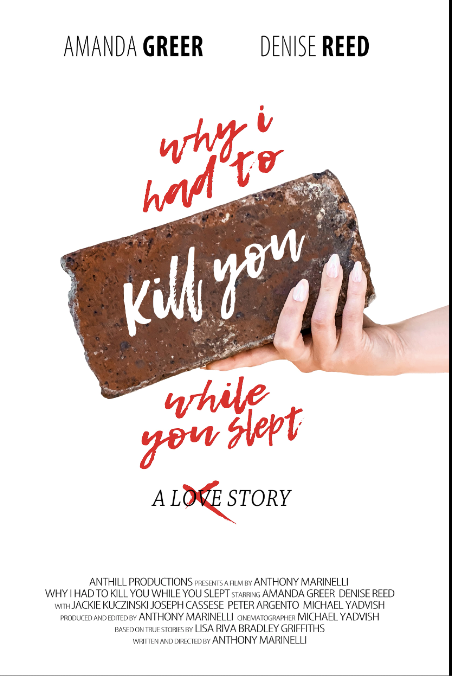
Nah, I think I'm probably kidding. If you're a husband and you see Anthony Marinelli's hilarious new short, Why I Had to Kill You While You Slept, before you go to sleep, you may not be able to fall asleep. Ok, I'm probably kidding about that, too. But you likely will feel a little guilty. And you'll certainly be laughing. And note that I'm not saying I'm kidding about that and that.
This 15-minute comedy and tutorial about what not to do if you're a husband provides a vivid little catalogue of what wives get upset about around bedtime -- snoring, not cutting your toenails so you accidentally gash your wife's thigh, going to sleep after you're satisfied but she's not, and you're... well, doing something that requires a powerful air-freshener to at most partially remedy. And then there's what men shouldn't do before they leave the bathroom -- leaving the seat up and not flushing.
Now, just to be clear, I've been married to the same woman for almost fifty years, and I've done none of that -- I'm innocent, your Honor, innocent! Ok, maybe I snore a litte, at least according to my wife.
But forget about me, and back to the movie. Marinelli wrote (with Bradley Griffiths and Lisa Riva) and directed, and the dialogue is barbed and funny. So is the rendition. Amanda Greer is perfect as Donna the long-suffering wife, as she's been in everything I've seen her do on stage and screen. So is Denise Reed as Lisa, Donna's friend, who manages to be both rational and receptive as Donna spills out her story. And Peter Argento was fine as Jim, the horrible husband, as was Jackie Kuczinski as his sexy sister, Michael Yadvish as her boyfriend, and Joseph Casesse as Lisa's not so horrible husband.
The movie was shown yesterday at the Chelsea Film Festival in Manhattan. It's 15 minutes you'll no doubt enjoy, unless you're like Matt, in which case you should see the movie and maybe learn a thing or two.
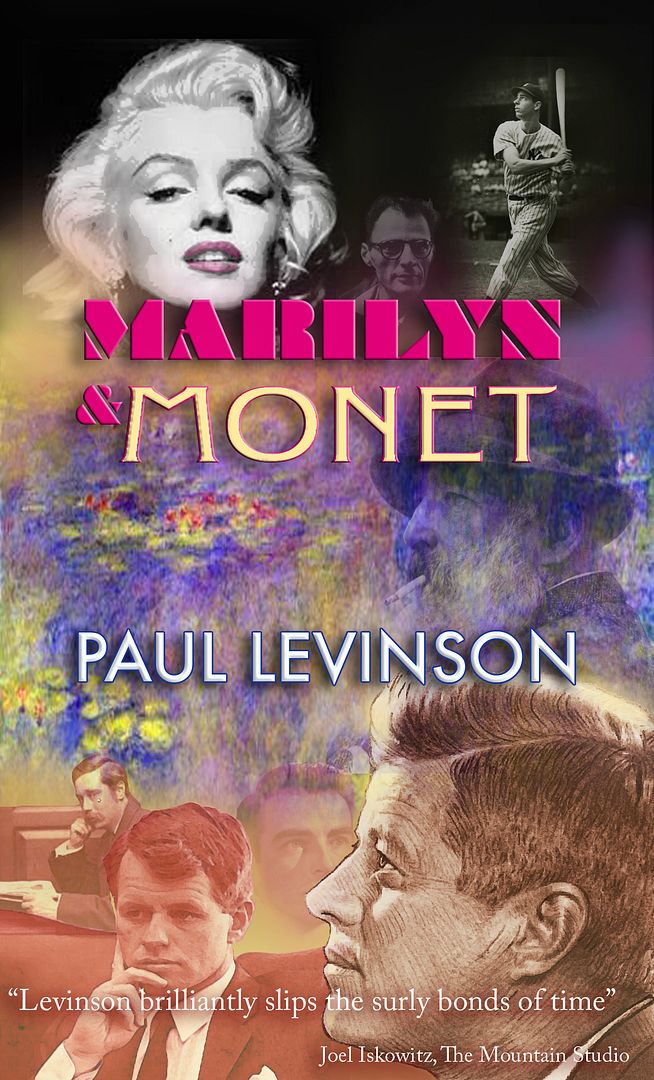
science fiction/fantasy novelette
A friend on Facebook asked me if it's possible to eradicate hate?
This was my answer: It's not possible to eradicate hate. But it's necessary to try to eradicate this particularly depraved rendition of hate that is Hamas. Just as was done with Isis and Hitler's Nazis. In both cases, the eradication was not complete, but surely the world was and is better without them.
I'll add here: In both cases, the destruction of ISIS and Hitler's Nazi regime also resulted in the death of innocent people. This opinion piece in The New York Times by David French, What It Would Mean to Treat Hamas Like Isis? explains why that loss of innocent life happens, and why it's possible to limit that loss of life but never prevent it entirely. French is a veteran of Operation Iraqi Freedom. He also thinks that the loss of innocent life in the attempt to destroy Hamas could well be less than what happened with ISIS but still unavoidable.
Hamas did unimaginably horrible things last week and set in motion a horrible situation with excruciating choices for Israel. Not only does Israel not want to harm innocent people, surely the last thing Israel wants now is to be responsible for the loss of more Israeli people. But Hamas took hostages, and though all sane and decent people hope all the hostages will be freed, it's clear that they will be endangered by whatever military action Israel takes in Gaza.
Amidst this hellish situation, Israel has even managed to take some humanitarian actions. US National Security Advisor Jake Sullivan told CNN a few hours ago that Israel has turned the water back on in southern Gaza. I don't know any more than you about how the Israeli campaign against Hamas will proceed. But I am hopeful that Israel will do everything in its power to minimize the loss of innocent life as it seeks to make sure that Hamas and its hate will never destroy an innocent life again.
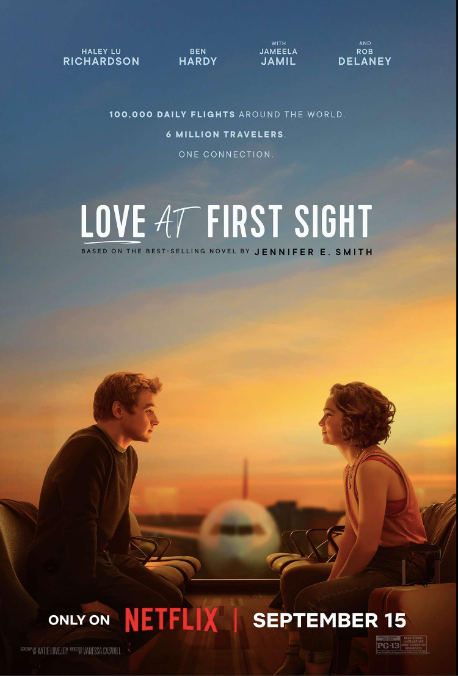
Hey, I don't usually review romantic comedies -- or dramas -- but Love at First Sight has both of that, and even a touch of fantasy and philosophy, so the 90-minute movie on Netflix was not only well worth watching but reviewing.
The set-up is charming: Hadley Sullivan and Oliver Jones meet on flight from New York to London, fall in love in the air, but are accidentally separated at Heathrow. Hadley's phone is dead, and, of course, in this day and age, neither thought to write any contact info down on a piece of paper, so the love they found on the flight may have flown (sorry) before it was declared or got anywhere.
Fortunately, here's where the bit of fantasy comes in. A stewardess on the plane sees what's going on, and shows up at crucial moments in London, looking slightly the same and seeking to make sure the couple find each other. Her voice also narrates the story, and in fact her name in the credits is Narrator.
There's even some science in this story, though it's far from science fiction. Oliver has dealt with the fears and troubles in his life by citing numbers and statistically probable outcomes in every situation. Hadley is more of a wordsmith. So Love at First Sight is also a story of math and poetry. And if you think about it, math has a powerful poetry to it, and rhymes -- which I always think of as a velcro of the mind -- are a kind of mathematics of sound. (Rhymes, by the way, were the way people remembered things before there was writing and reading and eventually smartphones.)
The acting in the movie is excellent. First time I've seen Haley Lu Richardson (Hadley) and Ben Hardy (Oliver) on the screen -- my mistake, Hardy was in a 2017 move about Mary Shelley, for God's sake, and I intend to see that as well catch up with some of Richardson's work. And Jameela Jamil was good as the Narrator/Guardian Angel, too.
The Narrator also delivers a crucial lesson about fate. If something is truly bound to happen, if a couple is destined to get together, will it happen whatever the obstacles and unexpected setbacks that may arise, regardless of what each member of the couple does? This notion of fate is also captured in the Yiddish word bashert and the Arabic kismet. All three -- fate, bashert, and kismet -- are connected to Tennyson's line, “'Tis better to have loved and lost than never to have loved at all," though in the movie that sentiment is taken from the question “Is it better to have had a good thing and lost it, or never have had it?” posed in Charles Dickens' Our Mutual Friend. (Hadley is a devotee of Dickens.) In any case, Tennyson is right, and the correct answer to Dickens' question of course is "better to have a had good thing and lost it." Though, hopeless romantic that I am, I'd say a far better answer still is having a good thing and keeping it forever.
And I won't say any more about the plot because I didn't warn you about spoilers -- do spoilers matter in comedy dramas? -- except to tell you that the comedy is funny and the drama in Love at First Sight will bring a tear or more to your eye.
I'll add as a postscript, however, that I think the title of the movie is a little trite. The movie was made from the best selling novel The Statistical Probability of Love at First Sight by Jennifer E. Smith, and that would have made a far more accurate and provocative title for the movie.
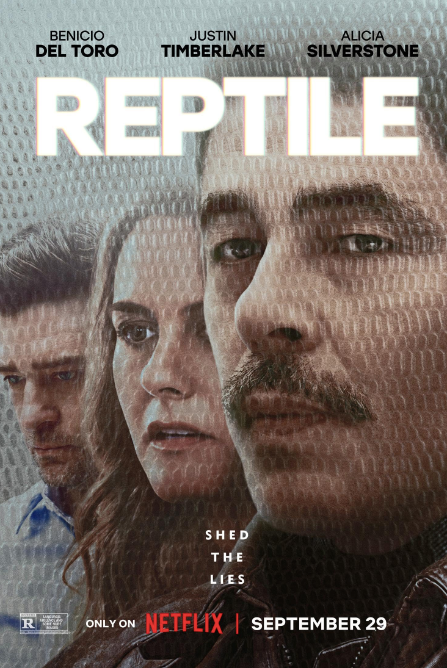
I saw Reptile on Netflix last night, a movie with touches of Body Heat and Blue Velvet. But it's most like True Detective, the anthology (new characters every season) but brilliant HBO series coming back with a new season in January 2024.
Meanwhile, Reptile has its grit and mix of painfully honest and corrupt detectives, investigating a lurid murder case. The victim is a real estate agent, in a less than happy relationship with her boyfriend, and--
[Spoilers ahead ... ]
It looks like the boyfriend didn't do it. But it turns out he did, and with a vicious vengeance. And when I say corrupt detectives, it turns out just about everyone working above or on the same level as lead detective Tom Nichols is running or turning a blind eye to a drug ring that Summer, a real estate agent and the murder victim, was unknowingly involved in. If this sounds complicated and little difficult to follow, it is. But the movie is lifted by some great music -- a new version of "Angel of the Morning" by Evie Sands Courtesy at the beginning and in the middle, and Dylan's "Knocking on Heaven's Door" at the end. And some superb acting.
Benicio Del Toro is always memorable on the screen, but he's better than ever in Reptile as Tom Nichols. Eric Bogosian, Domenick Lombardozzi, and Mike Pniewski are effective as Tom's varyingly corrupt superiors, Ato Essandoh is good as Nichols' junior and devoted partner Dan Cleary, and so is Alicia Silverstone as Tom's wife. Meanwhile, Justin Timberlake is just perfect as Summer's boyfriend Will Grady, though for some reason his excellent performances in just about every movie he's in continue to surprise me.
Del Toro, by the way, co-wrote the screenplay for Reptile, which has some fine film noir dialogue, with Grant Singer and Benjamin Brewer, and those two also wrote the story. Singer directed the movie. So a lot of talent went in to making this movie, and I'd say the movie amply reflects it. Indeed, I'll predict that Reptile will become something of a classic in the years to come.